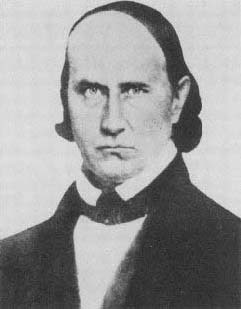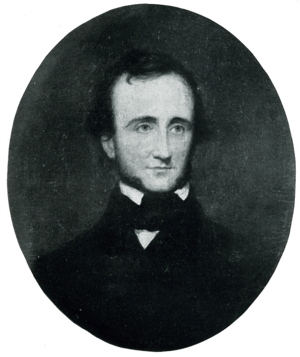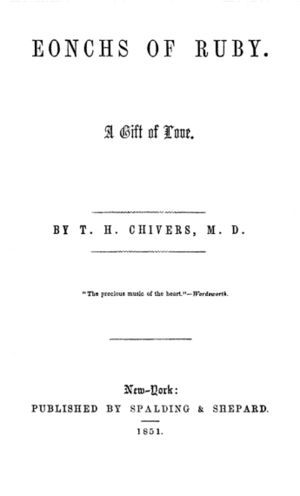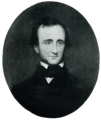Thomas Holley Chivers facts for kids
Quick facts for kids
Thomas Holley Chivers
|
|
|---|---|
 |
|
| Born | October 18, 1809 Washington, Georgia, United States |
| Died | December 18, 1858 (aged 49) Decatur, Georgia |
| Resting place | Decatur Cemetery |
| Occupation | Doctor Poet Playwright |
| Spouse | Frances Elizabeth Chivers Harriet Hunt |
Thomas Holley Chivers (born October 18, 1809 – died December 18, 1858) was an American doctor who became a poet. He was from the state of Georgia. He is most famous for his friendship with another well-known writer, Edgar Allan Poe. Chivers also became known for defending Poe after Poe's death.
Thomas Chivers was born into a wealthy family in Georgia. He became interested in poetry when he was quite young. After his first marriage ended, he studied medicine and became a doctor. However, he spent most of his time writing and publishing his works instead of practicing medicine.
Chivers wrote many poems for magazines and journals. He also published several books of his own poetry, like The Lost Pleiad in 1845. He also wrote plays. Edgar Allan Poe was interested in Chivers's writing and encouraged him. Chivers spent the last few years of his life defending Poe's good name after Poe died in 1849. Chivers believed that Poe had been greatly influenced by his own poetry. Chivers passed away in Georgia in 1858.
Chivers had strong ideas about writing. He believed that poets got their ideas from a special, almost magical, place. He wanted American writers to create their own unique style of literature. He especially supported young writers. His poems often had religious themes and talked about death. They also focused on meeting loved ones again in the afterlife. While he was somewhat known during his life, people mostly forgot about him after he died.
Contents
Thomas Chivers's Early Life and Works
Thomas Chivers was born on October 18, 1809. He was born at Digby Manor, which was his father's large farm near Washington, Georgia. When he was seven years old, he discovered poetry by reading "The Rose" by William Cowper.
In 1827, Chivers married his cousin, Frances Elizabeth Chivers. She was 16 years old. They separated soon after their daughter was born in 1828. After this, Chivers felt like Lord Byron, another famous poet whose wife had also left him. Chivers then went to Transylvania University in Kentucky and earned a medical degree in 1830.
Chivers traveled around the western and northern parts of the United States. He published his poems in different places before coming back to Georgia. In 1832, he published The Path of Sorrow. This was a collection of poems about his difficult first marriage. Two years later, he published Conrad and Eudora; or, The Death of Alonzo. This play was based on a real murder case from 1825 in Kentucky.
On November 21, 1834, Chivers married Harriet Hunt. She was from Springfield, Massachusetts. They had four children together, but sadly, all of them died young. Chivers published The Lost Pleiad in New York in 1845. It was popular at first, but sales quickly went down. In 1837, Chivers also published Nacoochee; or, the Beautiful Star, With Other Poems. He dedicated this book to his mother, who died a year later.
Chivers's Friendship with Edgar Allan Poe
Thomas Chivers is most famous for his connection with Edgar Allan Poe. In fact, people rediscovered Chivers and his writings in the 20th century because of this friendship. They first started writing letters to each other in 1840. They finally met in person in 1845 in New York.
The two writers became friends. Chivers even offered to support Poe financially for his whole life if Poe moved to the South. Chivers admired Poe's talent. He wrote that Poe was not being paid enough for his work on Graham's Magazine. Chivers told Poe, "He ought to give you ten thousand dollars a year... It is richly worth it." He also said, "It is not my opinion that you have ever been, or ever will be, paid for your intellectual labours." Chivers encouraged Poe to start his own magazine, called The Stylus.
Poe had hoped that Chivers would help fund The Stylus. He even thought Chivers might be a co-editor. Chivers thought about Poe's idea. However, he could not accept because his three-year-old daughter passed away shortly after.
Poe wrote about Chivers in a series called "Autography." This was published in Graham's Magazine in December 1841. Chivers and Poe wrote many letters before they met in June or July 1845. Chivers visited Poe when Poe was sick in bed. Poe's wife, Virginia, was also very ill with tuberculosis at the time. Chivers later described Poe's voice as being "like the soft tones of an Aeolian Harp."
By September 1845, Chivers was giving Poe advice. Chivers believed that Poe was wasting his amazing talents. Chivers also disagreed with Poe about what makes good art. Chivers believed that a poet should be like a visionary. He thought poets should capture mysterious experiences in their words. Poe, however, thought a poet was simply a very skilled writer.
After Poe's Death
After Edgar Allan Poe died, Chivers claimed that Poe had copied parts of his own work. He said Poe had taken ideas for famous poems like "The Raven" and "Ulalume" from him. However, other critics thought Chivers's own poems were just weaker versions of Poe's.
One of Chivers's poems, "The Vigil of Aiden," was a tribute to Poe. It used names like "Lenore" and the repeated phrase "forever more!" In 1854, Chivers wrote an essay called "Origin of Poe's Raven." He used a pen name, Fiat Justitia. In this essay, he claimed he inspired Poe to use a certain rhythm and the word "nevermore" in "The Raven." Chivers also suggested that Poe learned how to write poetry from him.
Even with these claims, Chivers continued to praise Poe. He was one of the first people to show the "real Poe." This was important because a writer named Rufus Wilmot Griswold was attacking Poe's reputation. Chivers wrote a memoir about Poe, which was published much later in 1952. Chivers believed Griswold was not good enough to edit Poe's works. He said Griswold did not understand his duties as a literary executor. Chivers kept defending Poe's reputation until he died.
Chivers's Final Years and Death
From 1845 to 1850, Chivers lived with his wife in Georgia. Then, he spent the next five years in the North. His poetry book Eonchs of Ruby, A Gift of Love was published in 1851. Chivers explained that "Eonch" meant "Shell of the Sea." He used the word because it sounded nice. In this book, Chivers focused on the sounds of words more than their exact meaning.
His work Atlanta: or the True Blessed Island of Poesy: A Paul Epic in Three Lustra was published in parts starting in 1853. Later that year, Memoralia; or, Philas of Amber Full of the Tears of Love was printed in Philadelphia, Pennsylvania. This book was not well-received. Soon after, the same publisher released Virginalia; or, Songs of My Summer Nights. This book was a collection of shorter poems.
By 1855, Chivers and his wife had moved back to Georgia. Chivers became suddenly ill. He wrote his will before he died on December 18, 1858, in Decatur, Georgia. His last words were, "All is perfect peace with me." His last published work was a play called The Sons of Usna. It had been published earlier that year. When he died, Chivers had several writings about his ideas on literature. He wanted to publish them as books and give lectures. He is buried in Decatur Cemetery.
Chivers's Ideas on Poetry and His Reputation
In his poems, Chivers used stories and ideas from Native American culture, especially the Cherokee. He often mixed these with Christian themes. He was also greatly influenced by the writings of François-René de Chateaubriand and Emanuel Swedenborg. Many of Chivers's poems talked about death and sadness. They often used images of shrouds, coffins, angels, and meeting lost loved ones in the afterlife. At that time, it was common for poetry to discuss death. Because he was a doctor, Chivers could describe the moments before death very clearly.
Chivers believed that poetry and God were closely connected. He thought that true poetry could only be written if a poet was inspired by God. He once wrote, "Poets are the apostles of divine thought." He also said that poetry "is that crystal river of the soul which runs through all the avenues of life." He believed it purified the heart and "empties itself into the Sea of God."
In his introduction to Atlanta, written in 1842, Chivers shared many of his ideas about poetry. These ideas came before many of the thoughts Poe would share in his essay "The Poetic Principle" (1850). For example, Chivers suggested that poems should be short to be good. He wrote, "No poem of any considerable length... can be pleasing to any well-educated person for any length of time." He also experimented with blank verse (poetry without rhyme) as early as 1832.
For a while, he thought Elizabeth Barrett Browning was the best English poet of his time. Like many writers then, Chivers wanted American literature to have its own unique style. He especially encouraged young writers. Poe called Chivers's 1845 poetry book The Lost Pleiad "the honest and fervent utterance of an exquisitely sensitive heart." Overall, Poe said Chivers was "one of the best and one of the worst poets in America."
William Gilmore Simms, another writer, also praised Chivers's poetry. He said Chivers had "a poetic ardor sufficiently fervid, and a singularly marked command of language." But he also thought Chivers needed more training. Simms also commented that Chivers's works were too gloomy.
Although Chivers was somewhat known during his life, his fame quickly faded after his death. Some writers, like Algernon Charles Swinburne, Dante Gabriel Rossetti, and William Michael Rossetti, admired his work. However, others were more critical. One reviewer joked that Chivers's writing was like a mix of different poets, with some "mild idiocy" and "sweetness and originality" thrown in. A literary expert, S. Foster Damon, wrote that Chivers might have been more famous if he had been born in the North.
List of Chivers's Works
- The Path of Sorrow; or, the Lament of Youth (1832)
- Conrad and Eudora; or, the Death of Alonzo (1834)
- Nacoochee; or, the Beautiful Star With Other Poems (1837)
- The Lost Pleiad, and Other Poems (1845)
- Search After Truth; or, A New Revelation of the Psycho-Physiological Nature of Man. (1848)
- Eonchs of Ruby: a Gift of Love (1851)
- The Death of the Devil, A Serio-Ludicro, Tragico-Comico, Nigero-Whiteman Extravaganza (1852)
- Atlanta; or, the True Blessed Island of Poesy, a Paul Epic (1853) [1]
- Memoralia; or, Phials of Amber Full of the Tears of Love (1853)
- Virginalia; or, Songs of My Summer Nights (1853)
- The Sons of Usna: a Tragic Apotheosis in Five Acts (1858)
Images for kids
See also
 In Spanish: Thomas Holley Chivers para niños
In Spanish: Thomas Holley Chivers para niños
 | Dorothy Vaughan |
 | Charles Henry Turner |
 | Hildrus Poindexter |
 | Henry Cecil McBay |






